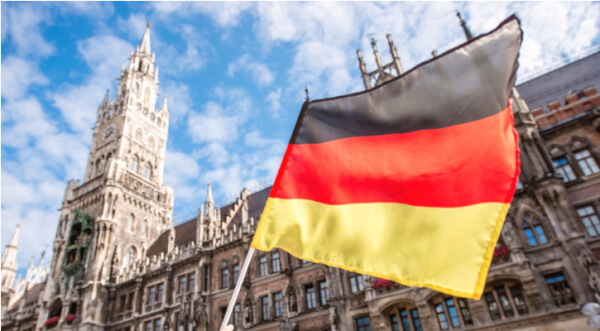Having a baby in Germany? You'll wanna know the costs
Are you or your partner expecting? While this is meant to be a very exciting time in your life, sometimes medical expenses and navigating public or private...

German Christmas traditions have hugely influenced the way that Christmas is celebrated the world over. From Christmas trees to advent calendars, the Christmas Markets that are commonly found throughout European towns and cities, and the mulled wine we like to drink while we visit them. If you love these Christmas customs and you’re headed to Germany for Christmas, you can get to see where it all began - and discover some more quirky, local traditions as well.
Here’s everything you need to know about Christmas in Germany.

Advent calendars are a central part of the German Christmas tradition. That means that Christmas celebrations stretch throughout the whole month of December, giving you plenty of time to enjoy your German Christmas experience.
Germany has a lot of traditions related to Christmas, many of which stretch back to the middle ages, which have now been adopted by other countries and cultures.
Even before November is over, you’ll find Christmas Markets popping up in German towns and cities, selling local and regional products and gifts. The Christmas festivities kick off in earnest at the beginning of December, as an advent calendar is used to count down the days until Christmas. You might find that a card calendar or one filled with chocolate treats is used, as in other parts of the world, while others use the more traditional ring of fire branches with some small gifts to open as the days count down.
In many parts of Germany, December 6th is celebrated as St Nicholas's Day. Kids put their shoes out near the window or balcony, on the night of the 5th, and if they've been good, St Nicholas will put small gifts in them. However, in some regions, he is also accompanied by a creature called Knecht Ruprecht or Krampus, who is there to punish the children who haven’t behaved during the year. Best hope you’re on the ‘nice’ list.
Gifts are usually given on Christmas Eve, which is also when the Christmas tree would have traditionally been put up and decorated. These days, however, most families put their trees up earlier, during advent. Christmas Eve then starts out as a working day, but with most businesses operating only a half day, or less, to free everyone up to enjoy the festivities. Even today, lots of people choose to go to church or a carol service, before having a family meal. With 2 days of public holidays on the 25th and 26th of December, there’s plenty of time to enjoy the season and have a rest.
The food eaten at Christmas depends largely on the region of Germany you’re in. Goose is always popular, although in areas with rivers or coastline, fish might also be served. Traditional favourites, such as potato salad and dumplings, are also typically chosen in a meal eaten at home and shared with family.
One perennial favourite in Germany - and indeed beyond - is Stollen, the sweet fruity bread served at Christmas time. This, alongside gingerbread and* lebkuchen*, Christmas biscuits, is available all advent long and enjoyed pretty much any time of day.

Santa Claus in Germany is known as der Weihnachtsmann, although in some areas in the south and east of the country, it’s not him who brings the gift, but das Christkind. Christkind literally means Christ Child and is usually represented by a young girl with blonde hair. Kids write letters to either der Weihnachtsmann or das Christkind at the beginning of advent, to ask for presents.
According to the ING International Christmas Survey, more than half - 53% - of Germans get money or gift cards for Christmas, rather than a gift. So if you’re in doubt about what to buy - now you know. A good chunk of people - 38% - get practical gifts, while some 25% get luxury items.
It’s also normal in Germany to give anonymous gifts, like a Secret Santa, in offices and workplaces. It’s considered bad luck, though, to find out who sent which gift, so don’t even try to guess.

According to survey data, German people spend an average amount of €200 each during Christmas. The British topped the list of which country spends the most, where the average amount spent is €420.
If you’re in Germany for Christmas, you might find you need to send money home for gifts or simply to pay for the festive period, which is inevitably costly. If you need to move your money around between accounts held in different countries, you can end up paying more than you should if you go through your regular bank. Even if international money transfers are advertised as free or cheap, they’re usually not. Banks and transfer services often add a markup of around 4-6% to the exchange rate to make sure that they can make a profit.
Instead of using a bank, you might find that your international transfer will be cheaper if you use a specialist service like Wise.
Wise offers safe and efficient transfers, and what’s more, they use thereal exchange rate, the same one you find on Google, with no sneaky hidden charges. You only pay a small fee, which is clearly shown upfront to make sure there are no surprises.
You might also want to consider getting your hands on a Wise borderless multi-currency account, which lets you hold cash in several different currencies, including euros. It’s easy to see your balance across different currencies, and switch between them at a low fee when you want to. For currencies like EUR, GBP and AUD – as well as USD for some countries – you can even get your own virtual account details, which will allow you to receive local transfers from others as well, and for the other supported currencies you can simply top up the account yourself. You can easily convert money from one currency to another when you need to, or when the rate is favourable, and make payments to recipients with a local account in the relevant currency.
Also, starting in early 2018, you’ll be able to get a card to make local payments and withdraw cash at an ATM.
See for yourself if you can get a better deal with Wise.

You’ll see Christmas Markets popping up in Germany from the end of November and the party really starts to get going in December. People use advent calendars to countdown the days and decorate their houses in preparation for the big day.
Important festive dates for Germany:
| German Holidays | Date |
|---|---|
| Heiliger Abend (Christmas Eve) | 24th December |
| Der erste und zweite Weihnachtsfeiertag(literally, the 1st and 2nd days of Christmas) | 25th and 26th December (Public Holiday) |
| Silvester (New Year’s Eve) | 31st December |
| Neujahrstag (New Year’s Day) | 1st January (Public Holiday) |
| Dreikönigstag (3 Kings Day) | 6th January (Public Holiday in some regions of Germany) |
If you’re in Germany over the Christmas period, either as a visitor or as an expat, you’ll find lots of great traditions which will make sure your experience is memorable. And naturally, as Germany is where many globally popular Christmas customs were born, you’ll find they’re done better here than anywhere else. Get yourself to a Christmas market, grab a glass of authentic mulled wine, and get ready to have a great time. Frohe Weihnachten!
*Please see terms of use and product availability for your region or visit Wise fees and pricing for the most up to date pricing and fee information.
This publication is provided for general information purposes and does not constitute legal, tax or other professional advice from Wise Payments Limited or its subsidiaries and its affiliates, and it is not intended as a substitute for obtaining advice from a financial advisor or any other professional.
We make no representations, warranties or guarantees, whether expressed or implied, that the content in the publication is accurate, complete or up to date.

Are you or your partner expecting? While this is meant to be a very exciting time in your life, sometimes medical expenses and navigating public or private...

Holidays in Germany are celebrated differently than in many parts of the world. Germans take their holidays very seriously, with celebrations that are steeped...

Germany is so much more than sausages and beer. The country boasts incredibly low unemployment, a high quality of life, and a wonderful mix of history,...

Germany is already home to a healthy expat community and a thriving tourism industry. People from all over the world regularly visit or relocate to Germany,...

If you’re moving to Germany, one of the first things you’ll have to consider is how you’ll get around. While local trips are often taken by bicycle or on...

Germany is a wonderful place to make a home, and is well known for having welcomed many migrants in recent years. However, its citizenship laws are actually...